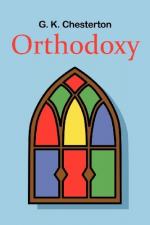
|
| Name: _________________________ | Period: ___________________ |
This test consists of 5 short answer questions, 10 short essay questions, and 1 (of 3) essay topics.
Short Answer Questions
1. What does Chesterton say concerning the boundaries of the will?
2. In moving through fairyland, what is the test of happiness, according to Chesterton?
3. What is the title of the essay that H. G. Wells wrote on skepticism?
4. How does Chesterton describe a madman's reasoning?
5. According to Chesterton, what characteristics do madmen share with many respected teachers and scientists?
Short Essay Questions
1. Chesterton ends Chapter II, The Maniac, with a look at the true skeptic. What picture does this man present? How does he relate to the man at the beginning of the chapter, the man who believed in himself?
2. What does Chesterton say is the spirit of the law in fairy land? Why is this not inconsistent?
3. In Chapter III, The Suicide of Thought, what is Chesterton's opinion of the skeptic? Why does the skeptic not have the right to speak out against anything? Why, contrarily, is he always speaking out against things?
4. According to Chesterton, the complete skeptic knows that he cannot think anything. How does this differ from the young skeptic? How does the complete skeptic show a true awareness of where he is?
5. "But it is a much more massive and important fact that he [the materialist] is not free to raise, to curse, the thank, to justify, to urge, the punish, to resist temptation, to incite mobs, to make New Year resolutions, to pardon sinners, to rebuke tyrants, or even to say 'thank you' for the mustard" (Chesterton 2000, pg 185). What is the context for this statement? Does it logically follow from Chesterton's argument?
6. Chesterton assumes that he and his reader will share the common ground of agreeing that an interesting, active life is preferable to simple existence. Is this a fair starting point? Why or why not?
7. Materialism is a much narrower belief than Christianity, in fact, more than any religion. What reasons does Chesterton give for this? How does it relate to the discussion of madness and sanity?
8. Chapter II, The Maniac, begins with the idea that man believing in himself is a weakness. Chesterton asserts this in the face of modern thinking, which says believing in oneself is the strongest way to live. What reasons does Chesterton give for asserting this statement?
9. The only authority for Chesterton's argument is the Apostles' Creed. Is this more or less effective than appealing to the Bible as the sole authority?
10. Chesterton says that a perfect view of the world combines a searching mind with the feeling of being welcomed. What does this mean? How does it relate to Christianity?
Essay Topics
Write an essay for ONE of the following topics:
Essay Topic 1
Why does God exult in what appears to humans as monotony? Does this lead to a sense of infancy or dullness misunderstood? What is Chesterton's reaction to this perception of God?
Essay Topic 2
What is the mindset of the madman? How does it differ from a sane man and how is it similar to a materialist? What is Chesterton's answer to this mindset? Does this answer take into account all aspects of the mindset?
Essay Topic 3
"For the orthodox there can always be a revolution, for a revolution is restoration." (Chesterton 2000, pg. 264) How is this true? How does this suit or shatter the common understanding of revolution?
|
This section contains 1,566 words (approx. 6 pages at 300 words per page) |

|




